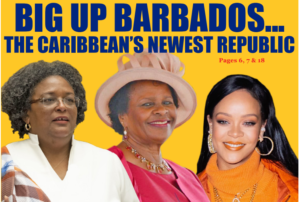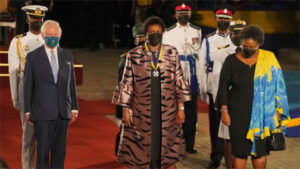New head of states is President Sandra Prunella Mason supplants the Governor General

Nearly 400 years after the country became a British colony, Barbados has become the world’s newest republic. The Caribbean island nation removed Queen Elizabeth II as the head of the state in a ceremony attended by Prince Charles.
Dame Sandra Prunella Mason, who was selected to become the first president of Barbados last month, took over as the President of the country. At a joint meeting of both the Houses of Parliament of Barbados, Speaker of the House of Assembly Arthur Holder announced the selection of Mason as the President of the country. Prime Minister Mia Amor Mottley said that Mason’s induction as president was a “seminal moment” in the country’s journey.
Mason, 72, has been the governor-general of the island since 2018. After studying at Queen’s College, Mason completed her judicial education in London followed by a judicial fellowship in Canada.
Mason started her career as a teacher and went on to work in the banking sector until 1978. She then began to work as Magistrate of the Juvenile and Family Court in Barbados.
Mason served as Chair and Vice-Chair at the UN Committee on the Rights of the Child from 1991 to 1999. She held the position of the Registrar of the Supreme Court until 2005. In 2008, she became the first female to be sworn in as the Court of Appeal Judge of the Supreme Court of Barbados. Mason, in 2014, became the first Barbadian to be a member of the Commonwealth Secretariat Arbitral Tribunal (CSAT) and in 2017 she also became the first female president of the Tribunal.
Barbados, which was made a ‘slave society’ by the British, first became an English colony when a ship arrived at the Caribbean in 1625. On November 30, 1966, Barbados gained its independence. Barbados, however, will continue to be one of the 54 Commonwealth nations.

Currently there are no plans to change the flags, coat of arms, national pledge or national anthem. However, the terms “royal” and “crown” would be dropped from all official references. Hence, Royal Barbados Police Force will become Barbados Police Force and crown lands would become state lands.
The country would continue to celebrate Independence day on November 30, but not just in remembrance of removing Queen Elizabeth II as the head but also in the memory of one of the country’s great leaders, Errol Walton Barrow.
While the decision to become a Republic is as recent as last year for Barbados, the island has been thinking about the move for decades. In 1979, the Cox Commission to attest to the feasibility of the republican system in Barbados was set up. The commission, however, had concluded that the public wished to remain under the system of constitutional monarchy.
In 1998, a constitutional committee had recommended that the country adopt the republican status and end the monarchy. In 2003, Barbados changed its final court of appeal from the British Judicial Committee of the Privy Council to the Caribbean Court of Justice.
On the 50th independence day in 2016, Freundel Stuart, the then prime minister of Barbados, had said that it was time to move from “a monarchical system to a republican form of government”.
Last month, announcing Mason as the new head of the state, Barbados Prime Minister Mia Amor Mottley had said that the time had come for the country to claim its “full destiny”.
Mottley had also said, “Barbados shall move forward on the first of December as the newest republic in the global community of nations.” She further added that the real work would begin the day after Barbados had become a full Republic.
Mason had also said in a speech, “The time has come to fully leave our colonial past behind,” She added, “Barbadians want a Barbadian head of state.”


